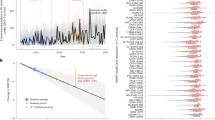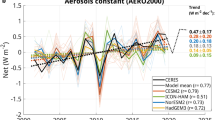Abstract
The selection of climate policies should be an exercise in risk management reflecting the many relevant sources of uncertainty. Studies of climate change and its impacts rarely yield consensus on the distribution of exposure, vulnerability or possible outcomes. Hence policy analysis cannot effectively evaluate alternatives using standard approaches, such as expected utility theory and benefit-cost analysis. This Perspective highlights the value of robust decision-making tools designed for situations such as evaluating climate policies, where consensus on probability distributions is not available and stakeholders differ in their degree of risk tolerance. A broader risk-management approach enables a range of possible outcomes to be examined, as well as the uncertainty surrounding their likelihoods.
This is a preview of subscription content, access via your institution
Access options
Subscribe to this journal
Receive 12 print issues and online access
$209.00 per year
only $17.42 per issue
Buy this article
- Purchase on Springer Link
- Instant access to full article PDF
Prices may be subject to local taxes which are calculated during checkout

Similar content being viewed by others
Change history
28 March 2013
In the version of this Perspective originally published online, in the equation in the caption of Figure 1, '–ln(2)' should have read 'ln(2)'. This error has now been corrected in all versions of the Perspective.
References
Schneider, S. H. What is 'dangerous' climate change? Nature 411, 17–19 (2001).
Weitzman, M. On modeling and interpreting the economics of catastrophic climate change. Rev. Econ. Stat. 91 1–19 (2009).
Dietz, S. High impact, low probability? An empirical analysis of risk in the economics of climate change. Climatic Change 103 519–541 (2011).
Yohe, G., Andronova, N. & Schlesinger, M. To hedge or not against an uncertain climate, Science 306, 415–417 (2004).
Piani, C., Frame, D. J., Stainforth, D. A. & Allen, M. R. Constraints on climate change from a multi-thousand member ensemble of simulations. Geophys. Res. Lett. 32, L23825 (2005).
Rowlands, D. et al. Broad range of 2050 warming from an observationally constrained large climate model ensemble. Nature Geosci. 5, 256–260 (2012).
Shiogama, H. et al. Perturbed physics ensemble using the MIROC5 coupled atmosphere–ocean GCM without flux corrections: Experimental design and results. Clim. Dynam. 39, 3041–3056 (2012).
Yokohata, T. et al. Reliability of multi-model and structurally different single-model ensembles. Clim. Dynam. 39, 599–616 (2012).
Kolstad, C. D. Fundamental irreversibilities in stock externalities. J. Public Econ. 60, 221–233 (1996).
Fisher, A. C. & Narain, U. Global warming, endogenous risk and irreversibility. Environ. Resour. Econ. 25, 395–416 (2003).
Heal, G. & Kristrom, B. Uncertainty and climate change. Environ. Resour. Econ. 22, 3–39 (2002).
Yohe, G. & Oppenheimer, M. Evaluation, characterization, and communication of uncertainty by the Intergovernmental Panel on Climate Change—An introductory essay. Climatic Change 108, 629–639 (2011).
IPCC Climate Change 2007: Synthesis Report (eds Pachauri, R. K. & Reisinger, A.) (Cambridge Univ. Press, 2012).
IPCC Managing the Risks of Extreme Events and Disasters to Advance Climate Change Adaptation (eds Field, C. B. et al.) (Cambridge Univ. Press, 2012).
Kunreuther, H., Pauly, M. & McMorrow, S. Insurance and Behavioral Economics: Improving Decisions in the Most Misunderstood Industry (Cambridge Univ. Press, 2013).
Roy, A. D. Safety first and the holding of assets. Econometrica 20, 431–450 (1952).
Ellsberg, D. Risk, ambiguity, and the savage axioms. Q. J. Econ. 75, 643–669 (1961).
Kunreuther, H., Meszaros, J., Hogarth, R. M. & Spranca, M. Ambiguity and underwriter decision processes. J. Econ. Behav. Organ. 26, 337–352 (1995).
Cabantous, L., Hilton, D., Kunreuther, H. & Michel-Kerjan, E. Is imprecise knowledge better than conflicting expertise? Evidence from insurers' decisions in the United States. J. Risk Uncertainty 42, 211–232 (2011).
Meinshausen, M. et al. Greenhouse-gas emission targets for limiting global warming to 2 °C. Nature 458, 1158–1162 (2009).
Millner, A., Dietz, S. & Heal, G. Ambiguity and Climate Policy Working Paper No. 16050 (NBER, 2010).
Allen, M. R. & Frame, D. J. Call off the quest. Science, 318, 582–583 (2007).
Gilboa, I. Theories of Decision under Uncertainty (Cambridge Univ. Press, 2009).
Klibanoff, P., Marinacci, M. & Mukerji, S. A smooth model of decision making under ambiguity. Econometrica 73, 1849–1892 (2005).
Savage, L. J. The theory of statistical decision. J. Am. Stat. Assoc. 46, 55–67 (1951).
Wald, A. Note on the consistency of the maximum likelihood estimate. Ann. Math. Stat. 20, 595–601 (1949).
Lempert, R. J., Groves, D. G., Popper, S. W. & Bankes, S. C. A general, analytic method for generating robust strategies and narrative scenarios. Manage. Sci. 52, 514–528 (2006).
http://www.worldresourcesreport.org/decision-making-in-depth/managing-uncertainty
Hall, J. M. et al. Robust climate policies under uncertainty: A comparison of Info-Gap and RDM methods. Risk Anal. 32, 1657–1672 (2012).
Report of the Conference of the Parties on its sixteenth session, held in Cancun from 29 November to 10 December 2010 (UNFCCC, 2011).
Acknowledgements
Thanks to Linus Mattauch for research assistance and to Malte Meinshausen for the data used in Fig. 1. Simon Dietz, Kristie Ebi, Christian Gollier, Robin Gregory, Benjamin Horton, Elmar Kriegler, Katharine Mach, Michael Mastrandrea, Anthony Millner, Michael Oppenheimer and Christian Träger provided comments on earlier versions of the paper. Partial support for this research came from the Wharton Risk Management and Decision Processes Center's Extreme Events project, the National Science Foundation (SES-1062039 and 1048716), the Travelers Foundation, the Center for Climate and Energy Decision Making (NSF Cooperative Agreement SES-0949710 with Carnegie Mellon University), the Center for Research on Environmental Decisions (CRED; NSF Cooperative Agreement SES-0345840 to Columbia University) and CREATE at the University of Southern California.
Author information
Authors and Affiliations
Contributions
H.K. and G.H. provided the conceptual framework for this Perspective. After sharing a preliminary draft with M.A., O.E. C.F. and G.Y., all authors contributed equally.
Corresponding author
Ethics declarations
Competing interests
The authors declare no competing financial interests.
Rights and permissions
About this article
Cite this article
Kunreuther, H., Heal, G., Allen, M. et al. Risk management and climate change. Nature Clim Change 3, 447–450 (2013). https://doi.org/10.1038/nclimate1740
Received:
Accepted:
Published:
Issue Date:
DOI: https://doi.org/10.1038/nclimate1740
This article is cited by
-
Parameter uncertainties in evaluating climate policies with dynamic integrated climate-economy model
Environment Systems and Decisions (2024)
-
New insights into projected Arctic sea road: operational risks, economic values, and policy implications
Climatic Change (2023)
-
Assessing the climate change exposure of foreign direct investment
Nature Communications (2022)
-
Combining global climate models using graph cuts
Climate Dynamics (2022)
-
Adaptive mitigation strategies hedge against extreme climate futures
Climatic Change (2021)



